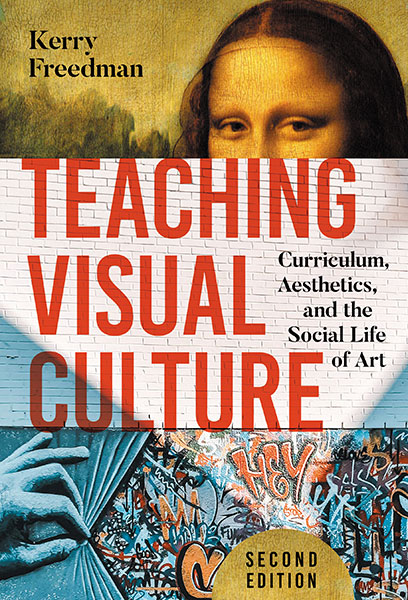Professors: Request an Exam Copy
Print copies available for US orders only. For orders outside the US, see our international distributors.
Second Edition
Publication Date: March 28, 2025
Pages: 240

An updated edition of the first book to focus on teaching the visual arts from a cultural standpoint.
Teaching Visual Culture provides the theoretical and practical basis for developing a curriculum that lays the groundwork for art education at all levels (K–12 and higher education) and across school subjects.
Drawing on material, social, cognitive, aesthetic, and curricular theories, Freedman offers a framework for teaching the visual arts from a cultural standpoint. Chapters discuss visual culture in a democracy; aesthetics in curriculum; philosophical and historical considerations; recent changes in the field of art history; connections between art, student development, and cognition; art inside and outside of school; the role of fine arts in curriculum; visual technologies; television as the national curriculum; student artistic production and assessment; and much more.
Additional content for the Second Edition includes applications of new materialism, ways to document and assess tacit knowledge in students, and uses of AI image generation.
Book Features:
Kerry Freedman is a professor of art and design education at Northern Illinois University.
"Teaching Visual Culture by Kerry Freedman is an essential resource for educators and art practitioners. It highlights the transformative role of visual culture in shaping identities, promoting critical thinking, and fostering democratic education. This second edition masterfully combines theoretical knowledge with practical strategies, empowering educators to integrate visual literacy and interdisciplinary learning in an increasingly image-driven society."
—Ami Kantawala, assistant adjunct professor, Teachers College, Columbia University
“This book is an outstanding resource for art education scholars and students seeking to comprehend and implement contemporary art education curricula. It presents a well-researched theoretical framework that serves as a solid foundation for engaging with visual art forms, aesthetics, and the complexities of cultural production. This book not only enhances the understanding of art education but also empowers educators to innovate and elevate their teaching practices. It is an essential read for anyone dedicated to advancing the field of art education and inspiring the next generation of artists and thinkers.”
—Ryan Shin, professor, College of Fine Arts, The University of Arizona
“The first edition of this important book saw the field of art education in a state of reconceptualization. The question then involved what should be taught about visual culture in a contemporary democracy and globalized society. Over 20 years later, this question remains more important than ever. This second edition, then, is timely, with new reflections on culturally sustaining pedagogy, new materialism, metamodernism, and situated learning, as well as color images and examples from students and practicing artists. All the while, Freedman focuses on what made the original edition so valuable to art education through the updated application of these theories to practice in multiple contexts and at all levels.”
-- Jeffrey L. Broome, professor and director of PhD Program in Art Education, Florida State University
Contents
Acknowledgments xi
Introduction 1
1. Visual Culture Theory and Practice in Education 7
Visual Culture, Learning, and Identities 8
Theorizing the Professional Field 13
Remnants of Social Theory That Shape Practice: Lessons From the History of Art in School 16
Sliding Off the Foundations of Curriculum 20
Challenging Boundaries 21
Conclusion 26
2. Visual Aesthetics: Form, Feeling, and Knowing 31
Aesthetics and a Culturally Sustaining Pedagogy 33
Multiple Types of Aesthetic Experience 35
Foundations of Modernist Aesthetics 38
Modernist Aesthetics in Curriculum 40
Making Connections Through Associated Knowledge 44
Neopragmatist Aesthetics 51
Conclusion 54
3. The Social Life of Art: Past/Present/Future 57
The Old and the New Art Histories 57
Contexts and Quality 63
Back and Forth: Juxtapositions in Spacetimemattering 69
Conclusion 77
4. Art and Cognition: Knowing Visual Culture 79
The Relationship of Form, Feeling, and Knowing to Learning 81
Psychobiological Conceptions of Artistic Development 87
Sociological Perspectives of Artistic Development 91
Four Social Ways of Knowing: The Social Dialectic, Construction of Knowledge, Distributed Cognition, and Situated Learning 95
Situated Knowledge 100
Conclusion 101
5. Interpreting Visual Culture: Constructing Concepts for Curriculum 103
Learning Critical Interpretation in Making and Viewing 104
Postmodernism, Metamodernism, and New Materialism in Curriculum 113
Difficult Knowledge: Critiquing Visual Culture as a Didactic Form 117
Conclusion 123
6. Curriculum as Process: Visual Culture and Democratic Education 127
A Contemporary Approach to Curriculum 129
Visual Culture in Curriculum Structures 132
Creating Agency: Tacit Knowledge and Intergraphicality in Curriculum 140
Changing Curriculum 143
Cultural Fragments in Curriculum 147
Themes for Teaching Visual Culture 150
Conclusion 155
7. Art.edu: Digital Artifacts, Artificial Intelligence, and Communities of Making 157
Technology as Experience and Phenomena 158
Student Uses of Art and Technology 164
Student Computer Production 168
Making/Watching Visual Culture: Students as Artists/Audience 171
Conclusion 176
8. Contributing to Visual Culture: Student Artistic Production, Assessment 177
Assessment: Seeing Tacit Knowledge 178
Critique and Community 184
Group Cognition and Assessment in the Arts 189
Student Group Assessment 195
Conclusion 198
References 201
Index 215
About the Author 225
Professors: Request an Exam Copy
Print copies available for US orders only. For orders outside the US, see our international distributors.